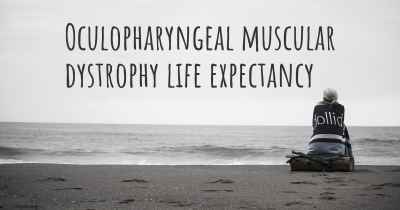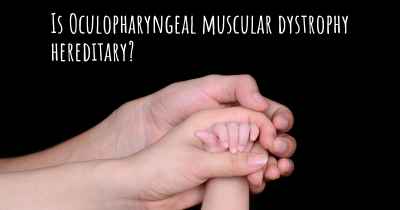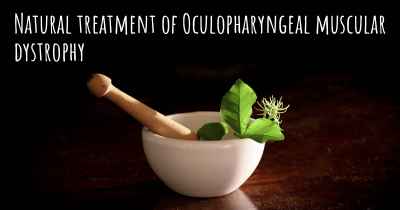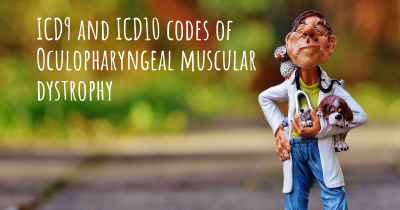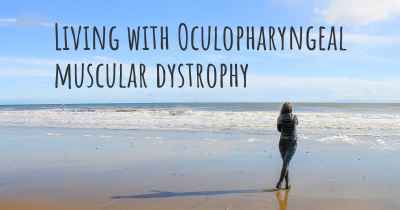Which advice would you give to someone who has just been diagnosed with Oculopharyngeal muscular dystrophy?
See some advice from people with experience in Oculopharyngeal muscular dystrophy to people who have just been diagnosed with Oculopharyngeal muscular dystrophy

Oculopharyngeal muscular dystrophy (OPMD) is a rare genetic disorder that primarily affects the muscles of the eyes (oculo-) and throat (pharyngeal). If you have recently been diagnosed with OPMD, it is understandable that you may be feeling overwhelmed and uncertain about what lies ahead. While each individual's experience with OPMD can vary, there are some general pieces of advice that may help you navigate this journey:
1. Educate Yourself:
Take the time to learn as much as you can about OPMD. Understanding the condition, its symptoms, progression, and available treatments will empower you to make informed decisions about your healthcare. Consult reputable sources such as medical professionals, patient support organizations, and scientific literature to gather accurate information.
2. Build a Support Network:
Reach out to your loved ones, friends, and family members to share your diagnosis. Their support and understanding can be invaluable during this time. Additionally, consider joining support groups or online communities specifically for individuals with OPMD. Connecting with others who are going through similar experiences can provide emotional support, practical advice, and a sense of belonging.
3. Establish a Healthcare Team:
Work with your healthcare provider to assemble a team of specialists who can address the various aspects of OPMD. This may include neurologists, ophthalmologists, speech therapists, physical therapists, and genetic counselors. Regular check-ups and open communication with your healthcare team will help monitor your condition, manage symptoms, and explore potential treatment options.
4. Focus on Symptom Management:
OPMD can cause a range of symptoms, such as droopy eyelids, difficulty swallowing, and muscle weakness. Collaborate with your healthcare team to develop a personalized symptom management plan. This may involve exercises to maintain muscle strength, dietary modifications to ease swallowing difficulties, and assistive devices to enhance daily activities. Occupational and physical therapy can also be beneficial in managing symptoms and maintaining independence.
5. Embrace Adaptive Strategies:
As OPMD progresses, you may encounter challenges in various aspects of your life. Embracing adaptive strategies and assistive technologies can help you overcome these obstacles. For example, using specialized utensils or communication devices can make eating and speaking easier. Explore available resources and assistive technologies that can enhance your quality of life and promote independence.
6. Prioritize Emotional Well-being:
Living with a chronic condition like OPMD can be emotionally challenging. It is important to prioritize your mental and emotional well-being. Engage in activities that bring you joy and relaxation, such as hobbies, meditation, or spending time with loved ones. Consider seeking professional support from therapists or counselors who specialize in chronic illness or genetic disorders.
7. Stay Informed about Research:
Stay updated on the latest research and advancements in OPMD. Clinical trials and scientific studies may offer promising treatments or interventions in the future. Engage with patient advocacy groups and research organizations to stay informed about ongoing studies and opportunities to participate in research. By staying informed, you can actively contribute to the advancement of knowledge and potential treatments for OPMD.
8. Communicate with Loved Ones:
Openly communicate with your loved ones about your condition, its impact on your life, and your needs. Educate them about OPMD, so they can better understand and support you. Clear communication can help foster empathy, strengthen relationships, and ensure that your support network is aware of your specific requirements.
9. Take Care of Yourself:
Remember to prioritize self-care. This includes maintaining a healthy lifestyle, getting enough rest, eating a balanced diet, and engaging in regular physical activity within your capabilities. Taking care of your overall well-being can positively impact your physical and emotional resilience in coping with OPMD.
10. Stay Positive and Seek Joy:
While living with OPMD may present challenges, it is important to maintain a positive outlook and seek joy in life. Surround yourself with positivity, engage in activities that bring you happiness, and celebrate small victories along the way. Remember that you are not defined by your condition, and with the right support and mindset, you can lead a fulfilling life.
Remember, this advice is meant to provide general guidance, and it is essential to consult with your healthcare team for personalized recommendations and treatment plans. OPMD may present unique challenges, but with the right support, knowledge, and strategies, you can navigate this journey with resilience and hope.
Posted Apr 27, 2017 by OPMDAWARENESS 1000
Posted May 18, 2017 by Monica 2150
Posted Oct 27, 2018 by Llauren 1300
Posted Feb 22, 2021 by James 2500
